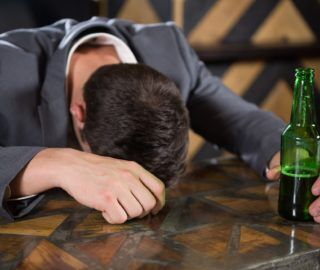We understand the conundrum every person with an alcohol problem faces: drinking is destroying your life, but you can’t quit. Some want to stop, but don’t know how. Others don’t think they have a problem, but you can plainly see the wreckage your friend or loved-one is leaving. Alcohol is an addictive substance that poisons not only the person abusing it but also contaminates the relationships you want so desperately to regain.
Alcohol Rehab


Rehab
Alcohol Rehab at Windward Way Treatment Center
If you have a problem with drinking, Windward Way will help you regain your life. If someone you know is struggling, we can reconnect you with your husband, wife, son, daughter, brother, sister or friend.
Windward Way provides the skills men and women need to keep a job and stay sober for the long haul—clients can discover the ways to overcome uncertainty or fear and live each day without a drink. Our alcohol treatment and rehab stand apart from the rest through integrity, compassion, and structured care.
Since withdrawal from alcohol can be uncomfortable (or even deadly), often the first place to begin is at our clinically supervised alcohol detox where you will receive the help you need to purify your body and mind from alcohol. From there, you will begin a highly customized and personalized program for treatment for alcoholism. Call us now to share your story so we can create a program for you or a loved one: (855) 491-7694.
A Common Problem
You are not alone! Every year, millions of adults suffer the effects from excessive alcohol consumption. Many of them will not receive the treatment they deserve.
Don’t be one of the millions who never seek help for alcoholism addiction. Don’t become a statistic to the criminal consequences that often accompany alcohol abuse. Don’t suffer from the consequences alcohol abuse invariably brings.
Instead, learn the skills you need to rebuild your life! Windward Way does this by restructuring your brain through individualized professional therapy, ongoing behavior modification, and a rich community life.
We want to help you reestablish daily living patterns to overcome the challenges you—and millions of others like you—will inevitably face. With our alcohol rehab center, you can learn that your life doesn’t need to revolve around liquor, beer, or wine to be happy, successful, and free.
What’s more is that Alcohol Use Disorder is only one of the addiction types we successfully treat. Since many of our clients often have complex, multiple diagnoses, we address your problem specific to your situation.
Wine Addiction
You might be thinking to yourself: who in the world only gets addicted to wine? However, the fact of the matter is that wine contains alcohol. Another fact is that different people have different preferences for the alcohol they choose to abuse. (News flash, right?)
What began as casually drinking wine to accompany a meal soon turns into a bottle a day. Then two or three. Then the reality becomes evident—you or someone you know has turned into a wine addict.
Windward Way addresses the problem of excessive wine use as an alcohol use disorder. It’s one of the many addiction types we treat. Often the first step upon admittance to our program of excellence is to enter our clinically supervised alcohol detox program. Since withdrawal from alcohol can be deadly, we first assess the need to treat this medically indicated condition.
Beer Addiction
Daily beer drinking is relatively common. Often, a person simply enjoys one beer to go together with grilled brats and hamburgers. However, when a person escalates to drinking a six-pack of beer in a single sitting or seeks to buy the cheapest brand (and highest alcohol content, such as malt liquor) so he or she can pound it down . . . he or she has most likely developed into a beer addict.
Beer, of course, is an alcoholic beverage. Beer addiction is an Alcohol Use Disorder (AUD). The first step we will assess for you or someone you know is whether our clinically supervised alcohol detox is necessary. Withdrawal from alcohol can be deadly, not to mention extremely uncomfortable. At our clinically supervised detox, we sometimes provide medications to help with this process. Rest assured, you’ll be taken care of unlike anywhere else. This will begin your recovery journey.
Windward Way treats the problem of excessive beer use as an alcohol use disorder. It’s one of the many addiction types we treat.
Liquor Addiction
It seems like most people start out either drinking beer or wine, then move to the “harder stuff” (but not always). But let’s face it, the phrase “liquor is quicker” exists for a reason.
When a drinking addiction gets out of hand—and you’re drinking hard liquor such as whiskey or vodka—it becomes as plain as the nose on your face that the problem has advanced to an all-out predicament: you are addicted to liquor.
Liquor is simply the distilled (a concentrated form) of alcohol. A drinking addict requires an addiction treatment for drinks and/or spirits. Like other forms of Alcohol Use Disorder (AUD, one of the many addiction types we treat), one of the first assessments we will make when you reach out is what sort of alcohol detox services you require, and that we can provide. Especially if a person has been drinking hard liquor for some time, withdrawal can be painful and even life threatening. Our medically supervised program seeks to smooth this transition as much as possible.
Alcohol Addiction Treatment and Rehab
Windward Way can design a custom-fit plan for you (or someone you know) to deal with the problem, head on. We have an inpatient alcohol addiction treatment program to address the issue not only from a medical standpoint but also one geared to give clients the tools they need to reclaim their lives.
Our clinically supervised alcohol treatment program is like no other. We endeavor to persevere alongside you, not only delivering the therapy and treatment you deserve but also by establishing a foundational structure from which to establish a new starting point for your life.
Our admissions process takes time because we want to hear your story and give you the most accurate and up-to-date information available. The courage to reach out is no small task. We get it. But we guarantee that we can give you the information you need to make a solid choice to regain the person you once knew. You (or someone you love) can have their life back. Don’t hesitate—we’re here for you now. (855) 491-7694.
Alcohol Rehab Centers: How to Get Help?
According to the Centers for Disease Control and Prevention, men are two times more likely to binge drink than women. In fact, around 23% of adult men admitted to binge drinking at least five times a month, according to one study. While binge drinking doesn’t necessarily count as addiction, this type of behavior could escalate quickly.
Recovering from alcohol addiction is by no means an easy process. That is why having the right type of treatment and support is crucial for patients. Patients must be aware of their options and find the right type of program for their unique needs. That means familiarizing with the process and everything that is available so that one can make the right decision.
Am I a Right Fit for Inpatient Alcoholism Treatment?
Inpatient treatments could benefit those that are struggling with a severe alcohol addiction. Keep in mind that withdrawal can be extremely intense and more than 5% of patients suffer from life-threatening seizures.
If the patient doesn’t have any familial or professional obligations, inpatient treatments are a great choice that will allow them to benefit from 24/7 medical care.
Do Individuals Receive Unique Recovery Plans and If So, How Are They Created?
Treatment protocols can be common, such as group or individual therapy, alcohol and drug lectures, and medical tests. However, the medical and clinical team will assess the patient’s current situation as well as their history of alcohol use, their metabolism, physical and mental state, and so on. The team will use this data to come up with a plan that will meet the particular needs of the patient. Once they have a treatment plan, physicians will ensure that the patient follows it strictly throughout the entire detox period.
What Are the Rules and Expectations at an Inpatient Center?
While each treatment facility is different and has its own set of rules, there are a few guidelines that one can expect to find everywhere:
- Access to cellphones and computers is prohibited or greatly limited
- Reading materials can only be recovery-related or spiritual
- Movies, TV, and music should not contain triggers
- Relationships between patients while in rehab are prohibited, and couples that want to attend rehab together are not accepted
- Visitors are allowed only according to a schedule, and each facility has its own rules about the duration of visits, their frequency, what is accepted during visits, and what patient behaviors can revoke visiting privileges
Most rehab facilities will have very strict policies regarding what patients may bring with them. In fact, they often have a recommended packing checklist, as well as a prohibited items list:
- The names, addresses and phone numbers of those involved in the treatment, such as family members, healthcare providers, and so on.
- A driver’s license or passport
- Some cash that they can use to buy goods from the vending machine
- A list of all prescribed medications and their dosages
- A notebook
- Pictures of family and friends
What Types of Holistic Treatment Options Are Offered at Alcohol Rehab?
Numerous facilities offer a diverse range of treatment options, designed to help their patients heal physically, mentally and spiritually. Our holistic rehab program may focus on healthy meals, many physical activities (swimming, hiking, biking), meditation sessions and exercises, and alternative psychotherapy types.
Recovery is a lifelong process and a commitment patients need to make to themselves to maintain the results they’ve worked hard to achieve. Any rehabilitation process starts with education on alcohol abuse recovery, giving hope to people, and realizing addiction doesn’t have to rule their lives.
Related Articles
- What is the Kindling Effect in Alcohol and Drug Addiction?
- Wet Brain Nutritional Deficiencies and Alcohol Use Disorder
- Alcohol Poisoning: Definition, Risks, Prevention and Treatment
- Wine Addiction Rehabilitation and Treatment Options
- Binge Drinking: When is it Time for Treatment? Procedures and Options





